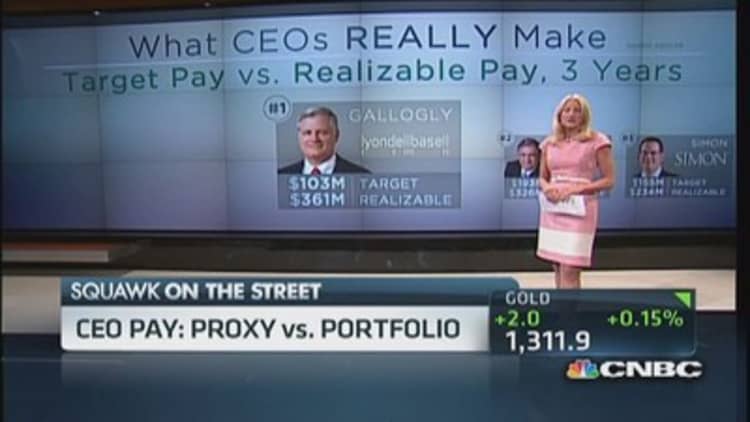Last year's "shareholder spring" has led Britain's largest companies to overhaul their remuneration packages, leaving top executives out of pocket, according to a new report.
Deloitte's annual report into the pay of FTSE 100 directors, published on Tuesday, found that bonuses had fallen on the previous year. The average payout for performance in 2012 was 67 percent of the maximum bonus available, compared with 75 percent in 2011 and 87 percent in 2010. The average maximum bonus available remained at 150 percent of executives' salary, according to Deloitte.
The move came after a number of shareholder revolts over executive pay in 2012. The so-called "shareholder spring" saw two FTSE 100 companies – insurer Aviva and advertising group WPP – fail to get the majority of shareholders to vote in favor of their CEOs' proposed pay packages.
(Read more: Top-paid CEOs are often fired or fined)
"Last year we noted that there was still work to be done on changing both bonus targets and expectations," said Stephen Cahill, partner in the remuneration team at Deloitte. "The lower bonus payouts appear to reflect lower earnings per share growth across FTSE 100 companies. Companies have listened to their shareholders and made a move in the right direction by strengthening the link between pay with performance."
Salary increases were also modest in 2013, according to Deloitte, with an average increase of 2.5 percent, while one third of directors received no pay rise at all.
"It is clear that companies now understand there is no rationale in normal circumstances for giving salary increases to executives that are higher than those given to other employees," Cahill said. "It also does not mean that there should be expectations of salary increases being awarded every year."
(Read more: SEC proposes CEO pay disclosure rule)

During last year's AGM season, there were growing calls for the introduction of clawbacks, which enable companies to reclaim benefits such as deferred shares. A firm could implement this procedure if, for example, an executive's performance was found to have been worse than originally estimated.
The number of companies with clawbacks arrangements in place rose to 80 percent in 2013, Deloitte said, up from 61 percent in 2012 and just 36 percent two years ago.
The report also found that a growing number of companies were measuring their executives' performance over periods of more than three years, with over one-quarter of firms incorporating longer timescales over the last year.
(Read more: Executive pay: Bonuses down, pay freezes up)
Cahill said these changes went some way to explaining why shareholders have been more supportive of executive pay packages this year. So far in 2013, no FTSE 100 company's remuneration package has failed to gain 50 percent of the shareholder vote.
"Our experience suggests that many companies, when they anticipated contentious issues, chose to engage with shareholders earlier and more extensively," he said. "We are starting to see a genuine move towards a stronger alignment between remuneration, company strategy and performance."
—By CNBC's Katrina Bishop. Follow her on Twitter @KatrinaBishop


